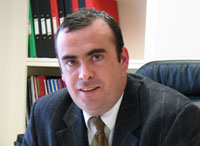Stomach cancer gene identified by UCD researchers
A research team at University College Dublin and the Mater Misericordiae Hospital, led by Dr Peter Doran, isolated a gene that is highly active in patients with stomach cancer. The gene called NET 1 helps the cancer cells to burrow through the stomach lining and spread out to invade other tissues and organs. Once the cancer cells spread, it is impossible to surgically remove all of them and the cancer is fatal.

Dr Peter Doran, Director of the UCD-Mater
Genome Resource Unit
The researchers based at the UCD-Mater Genome Resource Unit, where medical scientists conduct research to identify disease-causing genes, were searching for ways to corral the cancer cells in the stomach so that they might be more easily treated or removed. They started their investigations by using online databases to identify genes that are ‘switched on’ in particular tissues. By comparing readouts of normal stomach tissue with readouts of gastric cancer tissues, they identified the NET 1 gene as ‘switched on’ in cancerous cells and singled it out for further investigation.
‘We were interested in what the gene does and even more importantly whether there would be any potential for preventing it from doing what it does’ says Dr Doran.
To conduct further investigations the researchers required samples from patients. With the patients consent, the team collected and tested tissue from patients undergoing surgery for gastric cancer at the Mater Misericordiae Hospital. They collected a tumour sample and a matched normal sample from slightly outside the tumour of each consenting patient through biopsy. These ‘in vivo’ samples are much more effective for research than ‘in vitro’ samples - those developed in the lab. The ‘in vivo’ samples provided by patients provided the research team with more solid confirmation that the NET 1 gene was ‘switched on’ in cancerous cells.
‘The hope now is that the breakthrough will lead to the delivery of treatments that can keep cancer cells in one place so that treatment is easier’ explains Dr Doran. He believes that their findings will have implications for other forms of cancerous tumours. Stomach cancer is among the most common causes of cancer related deaths in the world.
‘Our clinical research helps discover ways to improve medical care and to establish new treatments which in turn will improve the quality of life for patients who are living daily with chronic illness,’ concludes Dr Doran.
The UCD-Mater Genome Resource Unit at the Mater Misericordiae University Hospital was funded through an award of nearly €6 million to the Dublin Molecular Medicine Centre from the Higher Education Authority’s Programme for Research in Third Level Institutions.
